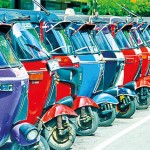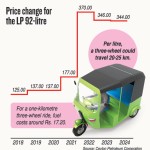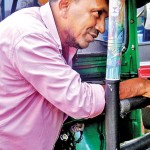News
Three-wheelers cite high operating costs for not cutting fares
View(s):By Nathara Abeywickrema
Three-wheeler drivers are demanding a further reduction in fuel prices if they are to pass on the benefits of the reductions to users.
The All-Island Three Wheeler Drivers and Owners Association says if the government lowers the petrol price to at least Rs. 300, operators will lower the fare to Rs. 80 for the first kilometre as before. They now charge Rs. 100 for the first kilometre.
With effect from July 1, the price of a litre of Octane 92 petrol was further reduced by Rs 11 to Rs 344. The price had been lowered by small amounts earlier as well.
The reduction in fuel prices, announced by the government in response to global oil price fluctuations, was intended to bring relief to the people hit by high prices.
However, the reluctance of three-wheel drivers to adjust fares has sparked public anger. These drivers, ubiquitous in urban and suburban areas, play a crucial role in the local transport network, providing convenient and accessible transport for people. Their fares are typically based on a combination of factors, including fuel costs, maintenance costs, and operating costs.
The Three-Wheel Drivers Association officials have justified their stance, citing reasons such as the rise in vehicle maintenance and other operating costs. They argue that while fuel prices have been reduced, other overheads are still high, necessitating the current fare structure.
The association’s president, Sudhil Jayaruk, told the Sunday Times that the reduction in fuel prices was inadequate to reduce fares. He said that, in comparison to the price increases of other items in recent months, the three fuel price reductions were not truly impactful.
He pointed out that they charged Rs. 80 for a kilometre when the petrol price was Rs. 165. “The price of petrol has surged by 65% since then, and the three-wheeler fare per kilometre has gone up only by Rs. 20,” he said.
Mr. Jayaruk said he believed that the price of petrol should be cut to Rs. 200 for three-wheelers to slash their fares, but they were prepared to go back to the Rs. 80 fare if the petrol price was brought down to at least Rs. 300.
The association officials also pointed to price increases in lubricants as another reason for their refusal to reduce the fares. Lubricating oil prices, for example, have increased to Rs. 1,400 per litre from Rs. 450 two years ago. The cost of a tyre has increased from Rs. 1,800 to Rs. 5,500, they said.
Mr. Jayaruk spoke dejectedly, saying that it would be difficult to exist even if the costs were lowered in response to the minor drop in fuel prices. In addition, the cost of spare parts and the taxes that go along with them have skyrocketed.
The National Transport Commission has been working for over four years to amend the law to include three-wheelers. The Western Provincial Council passed a draft resolution in 2003, but the Central Government’s powers to review fares have been removed during amendments, he noted.
The number of three-wheelers has increased threefold, and regulation has become necessary. The association seeks the formalisation of three-wheeler fares.
As the government grapples with economic uncertainties and expects the benefits of the fuel price reduction to reach the people, the resolution of this issue serves as a poignant reminder of the interconnectedness between economic policies, consumer welfare, and the responsibilities of service providers.
The issue has not gone unnoticed by the authorities. Government officials and regulatory bodies responsible for overseeing transport have stepped in to intervene.
The Western Province Road Passenger Transport Authority (RPTA) chairman, Prasanna Sanjeewa, said there are about 1.2 million three-wheelers, and regulation is a challenge for the authorities. This has been attempted for 22 years. However, some form of regulation is called for.
“An expert committee of the RPTA is analysing the factors that call for a fixed rate for three-wheelers in the Western Province,” he said, adding that by next week, it will be open for public representation.
Citing disagreements among different parties as the cause of the delay in introducing regulation, the National Transport Commission Chairman, Shashi Welgama, said there was no regulator until now.
The draft bill to regulate three-wheelers, taxi services, school vans, and office transport vehicles under the NTC is nearing completion, and the cabinet papers have already been produced. This means that the Act will take effect in the next month or two, according to Mr. Welgama.
The situation remains fluid as stakeholders navigate the delicate balance between consumer affordability, operational sustainability, and regulatory oversight. The outcome of ongoing negotiations and public discourse will likely shape future policies and practices within the three-wheel transport sector.
PickMe Sri Lanka’s Chief Executive Officer, Zulfer Jiffry, said the company has a right to offer the greatest possible value to tuk-tuk drivers and passengers.
He said a cost analysis is underway, taking into account spare parts, kilometres per hour, and fuel costs.
Tuk-tuk driver K.M. Thilanga, who operates from Kompanna Veediya, said he lowered the fare by Rs. 11. When asked why, he responded, “I don’t want it to make it worse because people already have too much on their plates.”
A.D. Gunaratne, a PickMe driver who operates from Town Hall, Colombo, said he has not heard from PickMe regarding a price cut yet.
The recent drop in fuel prices, according to tuk-tuk drivers Sarath Walpita from Kadawatha and H.H. Chameera from Matara, is not enough to bring down the fares.
They claimed that even locally made tyres that were previously priced at Rs. 2,300 now sell at prices over Rs. 5,000. In addition, the cost of servicing a three-wheeler is Rs. 7,900, in contrast to Rs. 3,600 two years ago.
Consumers and some public commentators have expressed disappointment, viewing the associations’ decision as unfair and exploitative. They point out that when fuel prices rise, the three-wheel association is prompt to increase fares, but when prices come down, they show no urgency to reduce fares.
Ragama residents K. Rajapakshe and S. Kuruwita, who often travel by three-wheelers, say that although fuel and coking gas prices appear to have dropped, the reduction had hardly any impact since the amount was so minor and much less than the price increase.
The best way to say that you found the home of your dreams is by finding it on Hitad.lk. We have listings for apartments for sale or rent in Sri Lanka, no matter what locale you're looking for! Whether you live in Colombo, Galle, Kandy, Matara, Jaffna and more - we've got them all!





